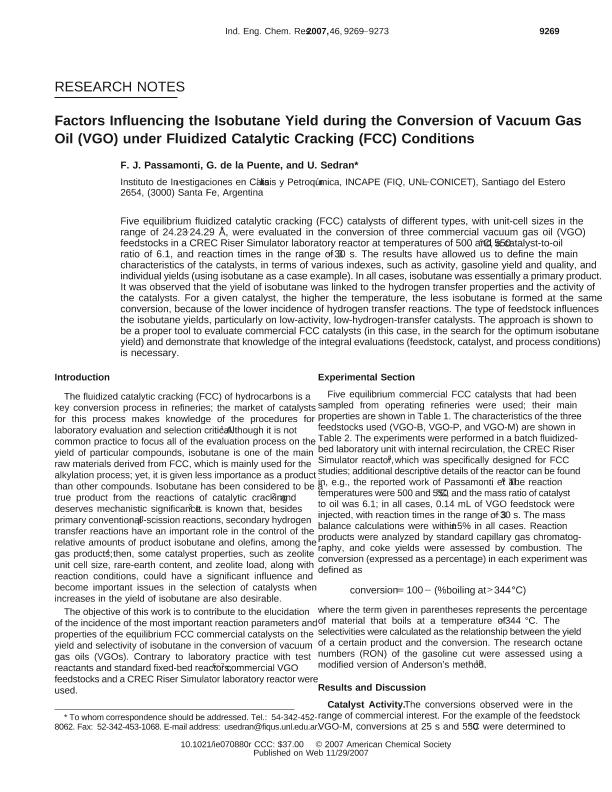Artículo
Factors influencing the isobutane yield during the conversion of vacuum gas oil (VGO) under fluidized catalytic cracking (FCC) conditions
Fecha de publicación:
12/2007
Editorial:
American Chemical Society
Revista:
Industrial & Engineering Chemical Research
ISSN:
0888-5885
Idioma:
Inglés
Tipo de recurso:
Artículo publicado
Clasificación temática:
Resumen
Five equilibrium fluidized catalytic cracking (FCC) catalysts of different types, with unit-cell sizes in the range of 24.23-24.29 Å, were evaluated in the conversion of three commercial vacuum gas oil (VGO) feedstocks in a CREC Riser Simulator laboratory reactor at temperatures of 500 and 550°C, a catalyst-to-oil ratio of 6.1, and reaction times in the range of 3-30 s. The results have allowed us to define the main characteristics of the catalysts, in terms of various indexes, such as activity, gasoline yield and quality, and individual yields (using isobutane as a case example). In all cases, isobutane was essentially a primary product. It was observed that the yield of isobutane was linked to the hydrogen transfer properties and the activity of the catalysts. For a given catalyst, the higher the temperature, the less isobutane is formed at the same conversion, because of the lower incidence of hydrogen transfer reactions. The type of feedstock influences the isobutane yields, particularly on low-activity, low-hydrogen-transfer catalysts. The approach is shown to be a proper tool to evaluate commercial FCC catalysts (in this case, in the search for the optimum isobutane yield) and demonstrate that knowledge of the integral evaluations (feedstock, catalyst, and process conditions) is necessary.
Palabras clave:
Isobutane
,
Fcc
,
Hydrogen Transfer
,
Fuels
Archivos asociados
Licencia
Identificadores
Colecciones
Articulos(INCAPE)
Articulos de INST.DE INVEST.EN CATALISIS Y PETROQUIMICA "ING. JOSE MIGUEL PARERA"
Articulos de INST.DE INVEST.EN CATALISIS Y PETROQUIMICA "ING. JOSE MIGUEL PARERA"
Citación
Passamonti, Francisco Javier; de la Puente, Gabriela; Sedran, Ulises Anselmo; Factors influencing the isobutane yield during the conversion of vacuum gas oil (VGO) under fluidized catalytic cracking (FCC) conditions; American Chemical Society; Industrial & Engineering Chemical Research; 46; 26; 12-2007; 9269-9273
Compartir
Altmétricas




